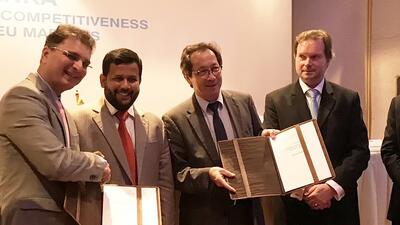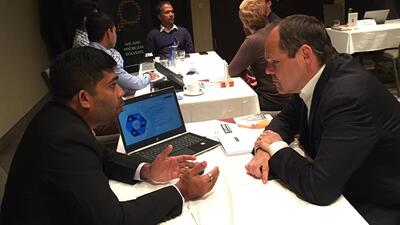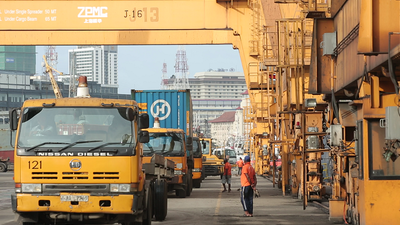



A cup of tea from Sri Lanka
Trade capacity building and technical assistance focused on training, skills development improves SME export competitiveness in Sri Lanka
Break the ice, cure a headache, host a guest or simply relax. All you need is a cup of tea.
It’s hard to think of anyone who does not like tea. The delicate beverage has won hearts for thousands of years. According to folklore, a Chinese emperor was once boiling a pot of water. A few tea leaves whirled into it accidentally which gave off an aroma that the Chinese emperor couldn’t resist. He drank the flavoured water and tea was born.
Today, the leaves of camellia sinensis we brew complete long journeys to reach us in the form of tea bags or tin packs. Small farmers, entrepreneurs and governments from more than 50 countries all do their best to win customers for their teas.
In Sri Lanka tea drinking is a visible part of daily life. You don`t really need a special occasion to sit down for a cup of tea, be it at a swanky coffee shop in the bustling capital Colombo or a get-together of farmers in a village. It is a simple and inexpensive way of bringing people together.
Thisara Kalana always knew that tea from his country is popular the world over. His own relationship with the beverage was infused early. This is why he seized the opportunity to join his family business in the town of Matugama in Sri Lanka`s lush Kalutara district. It is also the location he has chosen for the offices of his own new venture, Kandrick Tea.
Though he always wanted to take tea from his farm to the world, when Kalana first ventured into international markets he felt like a stranger. He lacked basic knowledge about export-related procedures and management practices. Sitting in his office with a view of his growing facilities, he spoke about the stumbling blocks encountered along the way.
‘I faced many obstacles as a new entrepreneur,’ Kalana recalled as he rinsed cups with hot tea before serving the drink, a practise he learned in China. ‘I did not know how to complete export-related paperwork due to little knowledge about the required quality certifications.
‘As a second-generation tea producer, our internal processes were mostly geared towards catering to domestic markets and we were quite set in our own ways, which made switching to suit exporting norms especially hard.’
What he did to improve the situation is testament to his passion to become an accomplished tea exporter. As the proprietor of Kandrick Tea, Kalana registered in the Sri Lanka Export Development Board (EDB) ‘2000 Exporters’ programme. This programme seeks to nurture new entrepreneurs to begin exporting their products during the 2017-2022 period at regional level.
Kalana benefited through his registration with the board to participate in an coaching programme for small and medium-sized enterprises (SMEs) organized independently by the International Trade Centre (ITC). This coaching programme sought to enhance SME compliance with export formalities in Sri Lanka, helping participants in improving their overall export competitiveness through better management practices and value addition to their products.
The business owner was assigned an export management coach (EMC) who critically examined the export practices of Kandrick Tea and guided the team on how best to optimize their operational procedures to boost exports.
Exporting to Malaysia had given Kalana a clear picture of what it took to become an accomplished exporter, which is why he was glad to have the opportunity to improve his knowledge and skill about his business to the next level.
‘I jumped at the chance to participate in this programme the very first instance I received the phone call,’ he remembers.
Kalana is now calibrating his pricing for different customer bases, packaging at different weights for different markets and palatalizing his products. He is more diligent on matters such as insurance – all as a direct result of the SME coaching programme.
’I did not know how to fill export-related documents, or even the difference between a commercial invoice and a packing list,’ he said. ‘I had problems in my labelling since they were coming off. Guidance on matters such as using stronger glue to overcome these small but important changes is just one example of detailed coaching I received from my coach.’
Tangible results are already being felt. Kandrick Tea started out exporting just 10 kilograms of tea to Malaysia. It has since penetrated newer markets and its rising export volumes have now exceeded 300 kilograms. Kalana is clear about the impact the ITC programme has made on his export volumes.
‘The advice I received from Nujith Samarawickrema, the coach assigned to me, was instrumental in expanding my exports from Malaysia to Hong Kong, China and even the Czech Republic,’ he explained.
Currently his business is developing a processing unit that will ensure that all internal processes of Kandrick Tea are fully optimised to be compliant with exporting procedures. Thisara is also keen to obtain an ISO 22000 certification required by many of his customers overseas.
‘The support I have received through ITC has motivated me to take things further in expanding not just my export volumes, but also in streamlining our processes,’ Kalana said with a smile. ‘We are now designing processing procedures that would suit Kandrick Tea’s exporting ambitions. We are on our way to obtain the ISO 22000 certification.’
The SME coaching programme has helped Thisara in numerous ways, and the success of the programme lies in the fact that a dedicated coach was assigned providing tailor made solutions for the Kandrick Tea brand.
ITC arranged the coaching programme within the framework of the EU – Sri Lanka Trade Related Assistance project. The four-year European Union-funded project worth 8 million euros ($9.8 million), contributes to inclusive trade-led growth and regional integration. It supports SME export competitiveness and value addition in sectors with high potential for economic growth and development.






